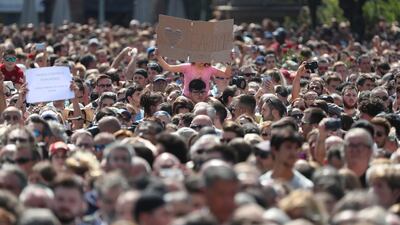Spain was struck last week by the worst terrorist assaults in the country since the 2004 Madrid train bombings. Early evening on Thursday, the driver of a white van crashed into pedestrians on Las Ramblas, a tree-lined thoroughfare in the heart of Barcelona that draws millions of tourists each year. The next morning, Spanish police foiled a second vehicular attack in the seaside town of Cambrils, 70 miles from the site of the first. Thirteen people were killed in Barcelona. At least a hundred people were injured. ISIL stepped forward to claim responsibility even before the shock had registered.
This was the eighth act of vehicular terrorism in Europe alone over the last year: Nice, Berlin, London, Stockholm and Paris have all hosted similar scenes of carnage. Further afield, a car was recently deployed in the United States by white supremacists to terrorise and kill anti-fascist activists. Before that, a woman was killed by a mentally ill man who barrelled his car into pedestrians in New York's Times Square. For killers of all hues, the weaponised automobile is suddenly the vogue.
It may be impossible to deter a man, and the perpetrators of these attacks are invariably men, who has decided to turn a car or a van or a truck into a death machine. But questions are invariably being asked about whether anything might have been done to minimise, if not prevent altogether, the loss of lives in Barcelona last week. Such questions stem from our tendency to ponder the "what-if" in the aftermath of every tragedy and horror. The fact that vehicles have repeatedly been repurposed to deliver death, destruction and chaos by terrorists ought to impel urban planners and city designers to seek out ways in which to minimise risks in key tourist and generally busy areas.
But ordinary people, too, must accept that 100 per cent security is an illusion in our societies. When all is said and done, what is left is our humanity. And that, more than anything else, is our greatest defence against the ravages of ISIL and the chauvinism and intolerance of the resurgent American and European right. The latter are already seeking to exploit the Las Ramblas attack for their own profit.
But the Spaniards – like the French, the Germans, the Swedes and the British before them – have demonstrated that they will not allow themselves to be consumed by hate. Almost a century ago, George Orwell called Las Ramblas the "dividing line" between the factions in the Spanish civil war. Some of those divisions still persist. But on Friday, less than 24 hours after the attack in Barcelona, tens of thousands of people gathered in the Ramblas and sang of unity. There could not have been a more stirring affirmation of humanity – or a more emphatic rejoinder to the purveyors of hate – than this.

